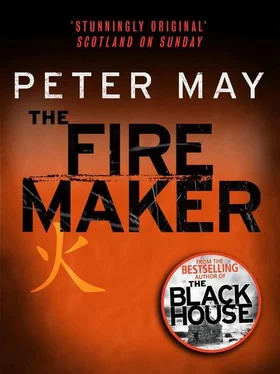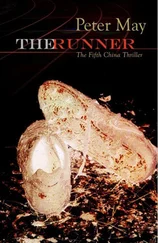Both Li and Qian had sung ‘Our Country’ as children, and ‘Let’s Build Our World Together’ had been popular when Li was a teenager in the eighties, and had won a national award. Both were struck by a sense of awe and amazement that this insignificantly tiny and ageing lady should have written such songs.
She saw their surprise and smiled ruefully. ‘Today, if I was thirty years younger and writing the same songs, I would have been gloriously rich, and very glamorous, and poor Mr Deng, had he still been alive, would have been very pleased with me.’
Liu Xinxin smiled, and her smile was infectious, and Li found himself being drawn to her. ‘It could not have been easy for you,’ he said. ‘A woman writing music in a man’s world. My uncle used to often quote an old proverb which he said was still part of the male Chinese mindset, even in communist China: “A woman’s virtue is that she has no talent”.’
The old lady grinned. ‘Ah, yes, but Mao said, “Women hold up half the sky”.’ And her words brought Margaret sharply, and unexpectedly, back into Li’s thoughts.
Qian had wandered over to the piano and lifted the lid to stare at the keys in wonder. Music was a mystery to him. ‘Did you write all your songs on this?’ he asked.
A sadness clouded her eyes. ‘Only the recent ones. The best I wrote on my first piano. It was the love of my life. My passion… Long gone.’ She paused. ‘But you came to ask about Mr Chao.’ She grinned bravely. ‘So… I’ll make us some tea and you ask.’
Li and Qian sat on the edge of low chairs as she bustled back and forth from the kitchen, boiling a kettle and making them cups of green tea. The children were somewhere else in the house, drumming incessantly on what sounded like an old tin, competing with the racket of the birds. ‘You said nobody liked him much,’ Li prompted her above the noise as she poured the tea.
‘That was mostly because no one knew him,’ Liu Xinxin said. ‘The Ministry of Agriculture owns several apartments in this block, but Mr Chao never mixed with those families. And with the rest of us he was… how can I explain it?… standoffish. Like he was better than us. You would recognise him in the street and say “hi” and he would look the other way. He never smiled or acknowledged anyone. I think he was a very sad man.’
‘What makes you say that?’ Li slurped his tea. It was good.
‘A man who never smiles must be sad,’ she said. ‘And his eyes, if you ever got a chance to look into his eyes, they were so full of pain, as if he were carrying some unbearable burden. Of course, Mr Dai, the elevator man, knew him best. He is on my committee, so we would often discuss Mr Chao.’ She paused to reflect, and then corrected herself. ‘When I say Mr Dai “knew” him, what I mean is that Mr Dai saw him most often. Like I said, no one knew him.’
Li asked, ‘And his family? Do you know anything about his background?’
She shook her head. ‘Only the information given when he first came.’
‘Which was how long ago?’
‘About two years. He had been working near Guilin in Guangxi province in the south for some years before they transferred him back north to Beijing and an apartment here. But he has not worked much in the last six months. He has not been well, I think.’ She leaned forward confidentially. ‘They said he had been married and divorced, and that he had a young family somewhere in the south.’ She dropped her voice. ‘He liked young boys, you know.’
Li stifled a smile. He could imagine the conversations that must have taken place between Liu Xinxin and Mr Dai and other members of the committee, about the comings and goings at Chao’s flat in the night. But they would have been afraid of his privileged position in Party and state. Perhaps they had reported him to the Public Security Bureau and been told to mind their own business. The scientific adviser to a minister of state would have been a powerful and influential man, a modern-day mandarin. One would have had to have trodden carefully. Li finished his tea and stood up. ‘Well, thank you very much, Old Liu. You have been very helpful.’ Qian took his boss’s cue and got to his feet.
‘Won’t you stay and have another cup?’ She seemed reluctant now to let them go.
‘We don’t want to keep you back, with your family due home soon.’
‘Oh…’ She waved her hand dismissively. ‘They won’t be back for ages yet. Would you like me to play you one of my songs?’
Not wanting to hurt her feelings, Li said, ‘We really don’t have the time.’
‘Just one, then,’ she said, and she headed for the piano and drew up a stool. ‘You must know “Our Country”. They sang it in all the schools.’
Li and Qian exchanged looks. There was no escaping it. ‘Just the one, then,’ Li said.
She beamed. ‘And you must sing it with me.’ And as she played a brief introduction, ‘I’ll sing the verses and you join in the choruses.’
As they stood round the piano singing the words and melody written by this old lady more than thirty years before, Li was glad that there were no witnesses to his embarrassment. He could imagine what comments would be passed in the office. At least he could rely on Qian, who seemed equally ill at ease, to keep silence. Then he noticed Liu Xinxin’s two small grandsons standing in the doorway looking at them in astonishment, and, a moment later, their equally astonished parents fresh home from work. Li closed his eyes.
They left the apartment, colour high on their cheeks, thoughts held close, and got into the Jeep. They sat for a long minute in silence before the first sign of a crack appeared in Li’s façade. A small explosion of air escaped his nostrils. Qian looked at him in time to see the façade crumble. It was infectious. His face cracked, too. Within moments, both were laughing almost uncontrollably, tears streaming, stomachs aching, like a couple of small boys hearing their first dirty joke. All embarrassment was dissipated. As Li gasped to catch his breath, he wondered for a moment what they were laughing at, before realising it was themselves.
A sharp rap at the driver’s window made them turn. It was a young uniformed constable. Qian rolled down the window. ‘Yes?’
‘Census Constable Wang,’ the officer said, peering in disapprovingly at the two grinning faces. ‘This is my patch. You should have come to me before interviewing members of this street committee.’
Li leaned over, still with a smile creasing his face. ‘Don’t worry about it, Wang. We were only here for a singing lesson.’ And he and Qian burst into fresh roars of laughter. Wang jumped back, pink-faced and angry, as Qian revved the engine and backed out into the compound with a squeal of tyres. He watched them go with the self-righteous anger of a thwarted petty bureaucrat, the sounds of their laughter still ringing in his ears.
When Li and Qian returned to Section One, there was a constant procession of people arriving to make statements. The street outside was jammed with bicycles and taxis, groups of men and women standing discussing the reason for their summons, children waiting in the care of patient grandparents. These were people from all walks of life: itinerant workers recently arrived in Beijing, small-time crooks, early morning habitués of Ritan Park — civil servants, factory workers, housewives, an army of pensioners. Additional officers had been drafted in from CID headquarters downtown to help with the interviews.
Qian could barely find space to park the Jeep, and he and Deputy Section Chief Li had to push their way through the bodies to reach the door. Inside was no better. There were queues trailing back down the stairs. Extra interview rooms had been set up on every floor to try to cope. Interviews were being recorded and transcribed, and the girls in the typing pool had been put on shifts to keep the flow of paperwork moving. And as far as Li could see when he entered his office, all that paperwork was moving on to his desk. There was a mountain of it accumulating there. Hundreds of statements had already been taken in all three murder cases — hundreds, maybe thousands, more were still to come. Also on his desk were the pathologist’s report from the autopsy on Chao, along with a résumé of his education and career at the Ministry of Agriculture, and various forensics reports from the different crime scenes. And beneath a pile of photocopied statements, he found the file he had asked Wu to take out on The Needle. He scratched his stubbled head and felt crushed already by the weight of it all. It could take weeks just to go through what was already there. A young female administration officer entering with another armful of statements was the final straw. He stood up and raised his hands to stop her. ‘Enough! I don’t want any more of these statements on my desk.’
Читать дальше












